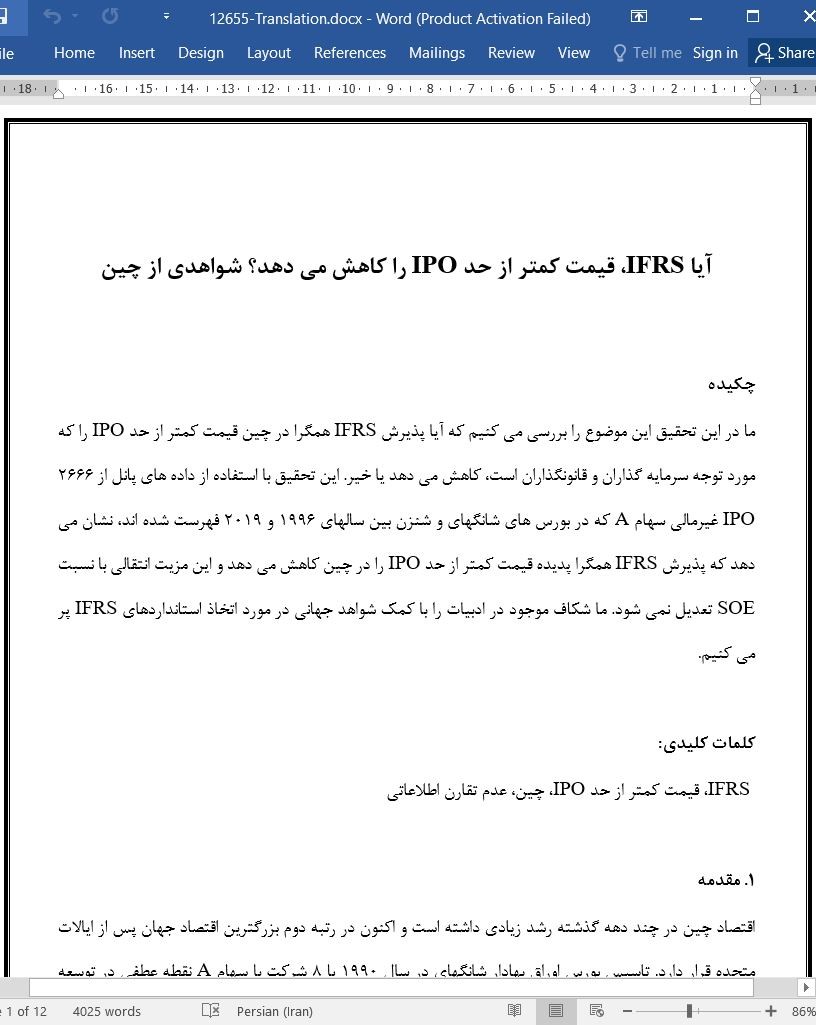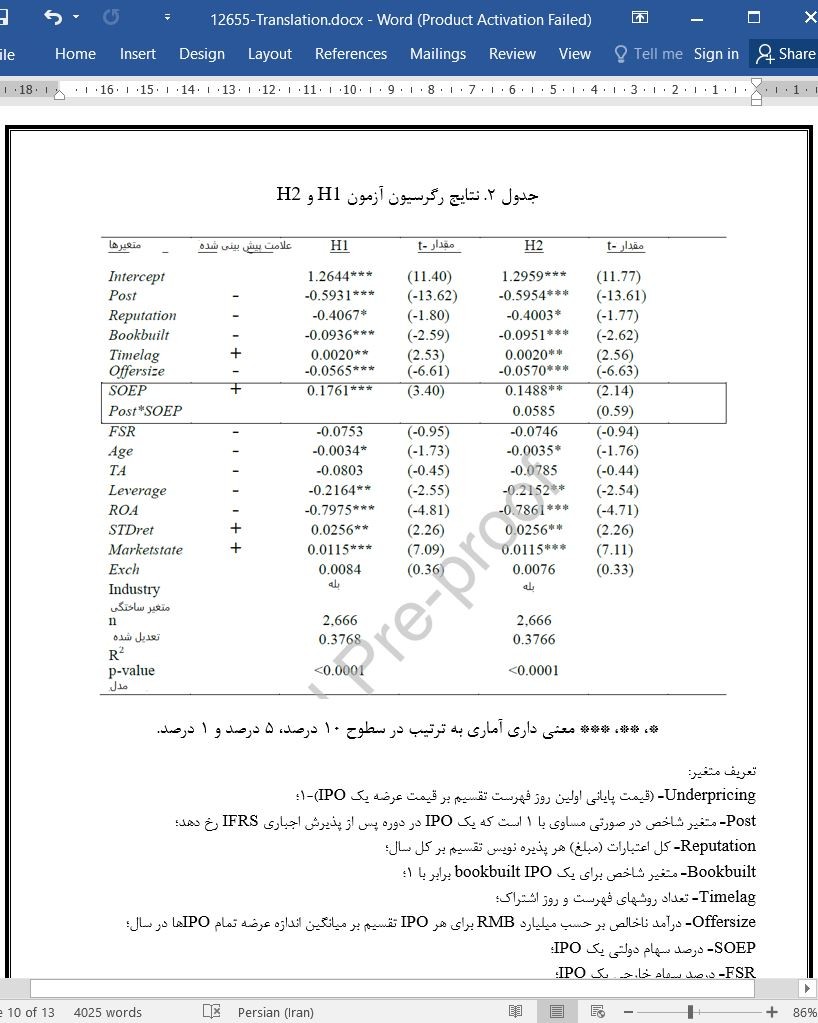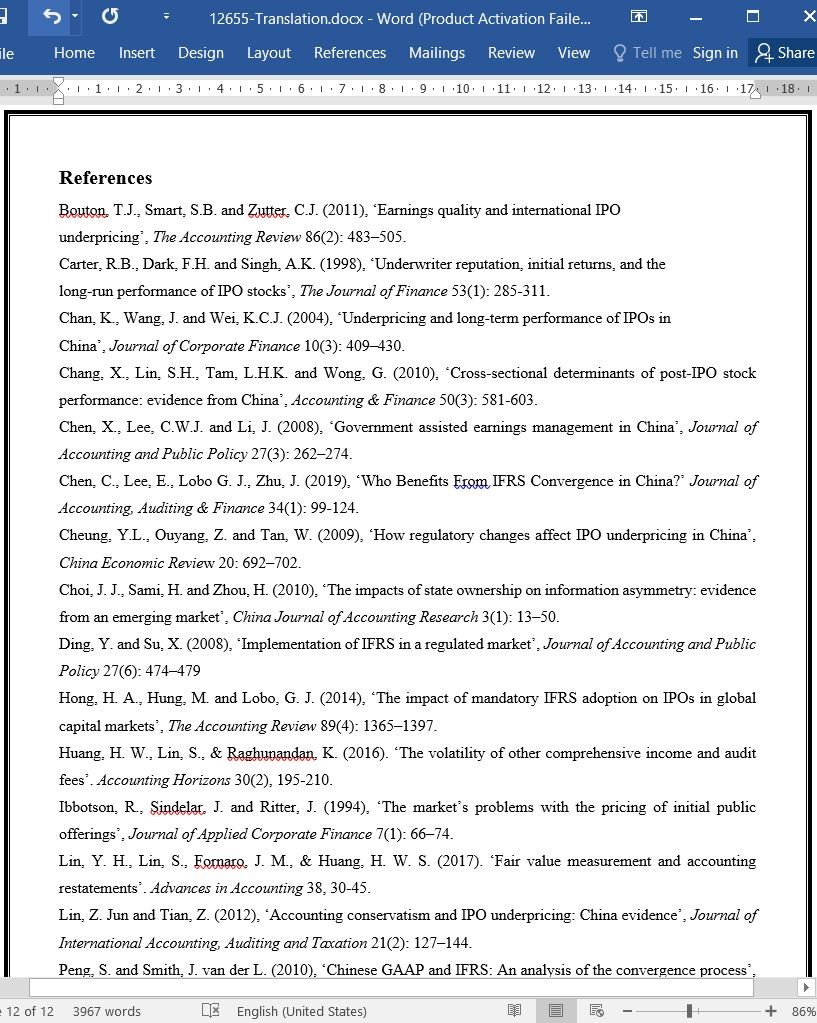
آیا IFRS، قیمت کمتر از حد IPO را کاهش می دهد؟ شواهدی از چین
چکیده
ما در این تحقیق این موضوع را بررسی می کنیم که آیا پذیرش IFRS همگرا در چین قیمت کمتر از حد IPO را که مورد توجه سرمایه گذاران و قانونگذاران است، کاهش می دهد یا خیر. این تحقیق با استفاده از داده های پانل از 2666 IPO غیرمالی سهام A که در بورس های شانگهای و شنزن بین سالهای 1996 و 2019 فهرست شده اند، نشان می دهد که پذیرش IFRS همگرا پدیده قیمت کمتر از حد IPO را در چین کاهش می دهد و این مزیت انتقالی با نسبت SOE تعدیل نمی شود. ما شکاف موجود در ادبیات را با کمک شواهد جهانی در مورد اتخاذ استانداردهای IFRS پر می کنیم.
1. مقدمه
اقتصاد چین در چند دهه گذشته رشد زیادی داشته است و اکنون در رتبه دوم بزرگترین اقتصاد جهان پس از ایالات متحده قرار دارد. تاسیس بورس اوراق بهادار شانگهای در سال 1990 با 8 شرکت با سهام A نقطه عطفی در توسعه بازار سرمایه چین بود. طبق گزارش سرمایه گذاران آلیانز گلوبال در سال 2017، 3498 شرکت با سهام A در بورس اوراق بهادار شانگهای و شنزن در سال 2017 با ارزش بیش از 8.7 تریلیون دلار ثبت شده بودند، در حالی که سرمایه گذاری خارجی کمتر از 2% ارزش بازار سهام A بود. با این حال، با گنجاندن سهام A چین در شاخص ای ام MSCI (بین المللی سرمایه ای مورگان استنلی) در سال 2018، انتظار می رود که سرمایه خارجی در سالهای آینده به صورت چشمگیری افزایش یابد که انگیزه این تحقیق را برای بررسی نحوه تاثیر استانداردهای گزارشگری مالی بین المللی (IFRS) بر بازارهای سرمایه ای چین تحریک می کند.
5. نتیجه گیری
IFRS اندازه گیری ارزش متعارف را بکار می گیرد تا با افشای بیشتر اطلاعات مالی، شرایط بازار را نشان دهد و از سرمایه گذاران در برابر ریسک خارج از ترازنامه محافظت کند، این موضوع بامعنی است که شواهدی را ارائه می دهیم که به این بحث کمک می کند که آیا پذیرش IFRS همگرای چینی، قیمت کمتر از حد IPO را کاهش می دهد یا خیر. پذیرش IFRS همگرای چینی و قیمت کمتر از حد IPO موضوعات مورد علاقه سرمایه گذاران و قانونگذاران هستند. یافته های ما مطابق با تحقیقات هونگ و همکاران (2014) نشان می دهند که پذیرش IFRS همگرا، قیمت گذاری کمتر از حد IPO را در چین کاهش می دهد و برای سایر اقتصادهای در حال گذار آموزنده است، به ویژه زمانی که قانونگذار ملی در تصمیم های مدیریتی و یاسی درگیر باشد. علاوه بر این، قضاوت مدیریتی در چین بسیار مرتبط تر می شود زیرا IFRS شامل اندازه گیری ارزش متعارف و همچنین مقررات مبتنی بر اصول است که حتی برای کشورهای توسعه یافته نیز چالش برانگیز است. در نهایت، یافته های ما پیامدهای سیاسی مشروعی برای IPO در سراسر جهان دارند، که قانونگذار ملی نفوذ مادی بر آن دارد.
Abstract
In this study, we examine whether the adoption of convergent-IFRS in China reduces IPO underpricing, which is of interest to investors and regulators. Using panel data from 2,666 non-financial IPOs of A-shares listed on the Shanghai and Shenzhen Stock Exchanges between 1996 and 2019, the study shows that the adoption of convergent-IFRS mitigates the phenomenon of IPO underpricing in China and this transition benefit is not moderated by the proportion of SOEs. We fill the gap in the literature with a contribution to global evidence on the adoption of IFRS standards. Keywords: IFRS, IPO underpricing, China, information asymmetry.
1. Introduction
China’s economy has undergone huge growth in the past few decades and is now the second largest economy in the world, standing only behind that of the USA. The establishment of the Shanghai Stock Exchange in 1990, with 8 A-share corporations listed, was a milestone in the development of China’s capital market. According to the Report of Allianz Global Investors in 2017, there were 3,498 A-share corporations listed on the Shanghai and Shenzhen Stock Exchanges in 2017, with a total market value of up to 8.7 trillion USD, while foreign investment accounted for less than 2% of the A-share market value. However, with the inclusion of China’s A-shares in the MSCI (Morgan Stanley Capital International) EM Index in 2018, foreign capital is expected to increase dramatically in the coming years, which motivates this study to explore how International Financial Reporting Standards (IFRS) impacts Chinese capital markets.
5. Conclusion
IFRS incorporates measurement of fair value to make financial information disclosure more reflect the market condition and protect investors from off-balance sheet risk, it is meaningful that we provide evidence contributing to the debate whether the adoption of Chinese convergent-IFRS mitigates IPO underpricing. Both the adoption of Chinese convergent-IFRS and IPO underpricing are issues of interest to investors and regulators. Consistent with Hong et al. (2014), our findings show that the adoption of convergent-IFRS reduces IPO underpricing in China, and are informative to other transition economies especially when the national regulator is tangled up in managerial and policy decisions. Further, managerial judgement becomes even more relevant in China because IFRS involves fair value measurement as well as principle-based regulation, which is a challenge even for developed countries. Finally, our findings have legitimate policy implications for IPOs worldwide, where the national regulator has material influence.
چکیده
1. مقدمه
2. توسعه فرضیه
3. آزمون های تجربی
4. نتایج
5. نتیجه گیری
منابع
Abstract
1. Introduction
2. Hypothesis Development
3. Empirical Tests
4. Results
5. Conclusion
References
- اصل مقاله انگلیسی با فرمت ورد (word) با قابلیت ویرایش
- ترجمه فارسی مقاله با فرمت ورد (word) با قابلیت ویرایش، بدون آرم سایت ای ترجمه
- ترجمه فارسی مقاله با فرمت pdf، بدون آرم سایت ای ترجمه



